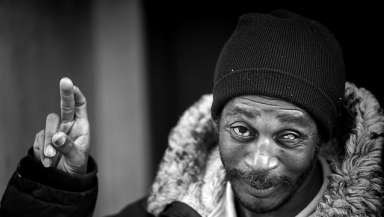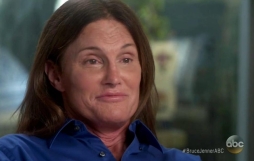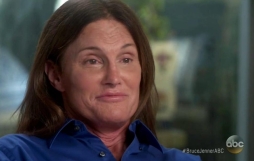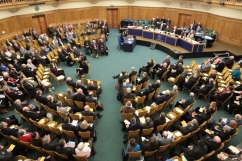
On April 24, all-American sporting superstar Bruce Jenner, who won gold for the decathlon in Montreal in 1972, announced that he was transsexual and that for all intents and purposes, "I'm a woman".
On Monday she revealed that her new name was Caitlyn. The shock was seismic: Jenner is not only a sporting hero but also features in the reality TV series Keeping up with the Kardashians, as until recently she was married to Kris and stepfather to her children.
What really perplexed evangelicals however, was that she was both a Christian and a Republican – neither of which really seemed to fit with her new identity. She said in her interview with Diane Sawyer: "I would sit in church and always wonder, 'In God's eyes, how does he see me?'"
Jenner's revelations made headlines because of who she is. But there are more and more people, and not just in the US, who identify themselves as transsexuals – generally used for people who transition from one sex to another – or transgender, whose sense of their gender differs from their physical sex. In a sign of how what was once rare is now becoming mainstream, a few days ago the vicar of Lancaster Priory, Rev Chris Newlands, proposed that the General Synod of the Church of England debate a new service to mark people's transition to a different gender.
For some Christians, helping people to transition from one gender to another is a compassionate response to a deeply-felt need. Others are profoundly uncomfortable about the theological implications of such interventions. So what are the issues, and how should Christians approach them?
The questions arise when someone suffers from a condition known as "gender dysphoria" – simply put, when a person suffers because their physical gender is at odds with what they believe is their real gender. The NHS describes it as "a condition where a person experiences discomfort or distress because there is a mismatch between their biological sex and gender identity". So someone might have male genitalia and may even be married and father children – as Jenner did – but still feel that they're really a woman, and vice versa.
In some cases, the person's conviction is so deeply rooted that surgery and hormone treatment are judged to be justified in order to transform their appearance as far as possible to fit their chosen gender. In these cases, medical professionals believe that it helps them lead fuller and happier lives. Others choose to live as far as possible according to their felt 'real' identity without surgery.
The causes of gender dysphoria are debated. For many years it was believed to be purely psychological in origin. However, more recent studies appear to show that it may have a physiological basis and may be caused by the development of gender identity before birth, with the hormones that control the body and the brain not working in harmony during the development of the foetus in the womb. So hormones might determine that a child has male reproductive organs but a 'female' brain.
Treatments for the condition span the full range from counselling to full-scale gender reassignment surgery. People who don't choose that or aren't suitable candidates might have speech therapy, hair removal or hormone therapy. If they do want to make a full transition they'd be expected to live in their chosen gender identity for at least a year beforehand. The rigorous process of assessment generally seems to 'work': according to the NHS, after surgery most transsexuals are happy with their new sex and feel comfortable with their gender identity. One review of studies carried out over a 20-year period found that 96 per cent of people who had gender reassignment surgery were satisfied (though a 2011 Swedish survey found "considerably higher risks for mortality, suicidal behaviour, and psychiatric morbidity than the general population").
However, many evangelical Christians have serious theological doubts about the procedures, and about the increasing normalisation of the 'transgendered' identity.

They argue that gender is fixed at birth and just can't be changed. So leading US conservative commentator Russell Moore says in connection with Jenner: "We should stand for God's good design, including around what Jesus says has been true 'from the beginning' – that we are created male and female, not as self-willed designations but as part of God's creative act".
An Evangelical Alliance report in 2000, Transexuality, says: "We affirm God's love and concern for all humanity, but believe that God creates human beings as either male or female. Authentic change from a person's given sex is not possible and an ongoing transsexual lifestyle is incompatible with God's will as revealed in Scripture and in creation. We would oppose recourse to gender reassignment surgery as a normal valid option for people suffering from gender dysphoria on a biblical basis."
It called for the medical profession to investigate the "root psychological, social, spiritual and physical causes of transsexuality". While it recommends "gentleness and restraint", it says that transsexual people need to "reorientate their lifestyle in accordance with biblical principles and orthodox Church teaching".
One of the report's authors, EA head of public affairs Dr Don Horrocks, spoke to Christian Today. He's clear that this is still the formal position of the Alliance and is sceptical of the view that gender dysphoria has a biological basis.
"We would describe it as a psychological condition that usually involves someone rejecting themselves in some way. It's an overwhelming psychological belief that they will feel better and be more able to accept themselves if they were of the opposite sex."
The causes are complex, he believes, and may include a genetic predisposition. However, he says we should look for explanations in terms of a combination of factors, notably genetic and environmental, together with life experiences, early sexual experiences and environmental factors.
"We object fundamentally to the premise of treating psychological conditions with surgery," he says.
He believes there is a serious theological problem with accepting that people can change their gender.
"We live in an age where people think they can construct their own identity and demand that the rest of the world goes along with it," he says. Transgender Christians "construct a mythology" that they are "really, for example, a man trapped in a woman's body" as a result of an accident of birth. So their 'real' identity is what their mind tells them rather than their body – and so the brain is privileged over the body.

"This is contrary to the Judeo-Christian belief that sexuality is a given, to be blessed and welcomed," he says. It's akin to the ancient heresy of Gnosticism, in which the body is effectively despised and what really counts is mind or spirit.
For Horrocks, the key to understanding sexuality is in the Genesis creation stories, where "humanity is created unambiguously binary: gender is not constructed, it's given". So the Christian's approach should be about accepting ourselves as God created us. "How can it be right to disfigure our bodies and do radical and invasive things to them, and spend a lifetime on hormone therapy and other treatments?"
Horrocks believes that gender dysphoric people can be helped through holistic psychotherapy if motivated. He's adamant that the Church should never reject them but welcome them as they would anyone else, and recounts stories of how he's helped churches integrate transgendered people into their congregations. "They need to be accepted as they are, though ultimately wise Christian pastoral care would be seeking to help people come to accept themselves as God created them. We can't expect it to happen overnight. You might have to spend years of showing love and pastoral support, but we hope and pray that the underlying causes of unhappiness and rejection can be addressed pastorally through the restorative power of God."
Horrocks presents a clear and passionate case against seeing a change of gender as anything like a positive step. However, the EA's position is not without its critics. The Church of England, for instance, has coped with priests who have 'transitioned'; the first, Carol Stone – who died last year – in 2000.
Another transgender priest is Rev Rachel Mann. Unsurprisingly, she's critical of the idea that "someone like me is essentially delusional". "The Bible is not interested in biology, and modern biology is much more complex than just male and female," she tells Christian Today.
She is comfortable with her gender as a woman. However, perhaps more surprisingly, she's wary of the idea that surgery can simply 'cure' people with gender dysphoria. "Most medical professionals involved in this area acknowledge that they aren't seeking to provide cures, but options to enable different situations become more liveable," she says. These can literally be life-saving: it's dangerous to be trans, even in our enlightened society. But "receiving support to transition will not take away a person's problems", though it might make them feel more at ease with who they are.
She speaks of being in what she calls the "broken middle". "In a profound sense, I am absolutely a woman. But it would be absurd if I didn't recognise that part of my history is that I was raised as a boy. I've lived most of my life as a woman, but there is still a brokenness there, an absence. For a Christian that's really important, because there's something holy about brokenness."
She's also aware of the advantages possessed by people like Caitlyn Jenner, who is acceptable because she conforms to the stereotypical image of what a woman looks like. Jenner appeared on the cover of Vanity Fair in a glamorous pose looking every inch a woman. But not everyone who transitions from male to female can do that. "All of us, trans and non-trans, carry around stereotypes of what a woman is and what a man is," Mann says.
That's a point also made by Horrocks, who says that many transgendered people struggle to fit in to their new identify because they simply don't look the part. For Mann, however, "that can lead to profound questions about what we mean by gender in the first place". She adds: "I hope we reach the point where someone who's transitioned doesn't have to look like a woman."
There's no doubt that there is a fundamental divide between Horrocks and Mann and the schools of thought they represent. For Horrocks and many in the wider evangelical world, gender dysphoria is a psychological aberration which needs to be corrected, not encouraged and expressed. It is a caricature of their position to say that it rests on a single proof-text ("Male and female he created them", Genesis 1:27), but they do claim that the 'binary' character of the early chapters of Genesis is not just descriptive, but normative.
For others – including most medical professionals – gender is not prescribed. It is negotiable, and a change of gender – whether aided by surgery or not – to alleviate the extreme mental distress suffered by those with gender dysphoria is entirely appropriate.
The extent of this distress shouldn't be underestimated. Very few people would actually choose to be transgendered. People with gender dysphoria have higher rates of depression and face bullying, rejection and intimidation. A 2007 study found that 34 per cent had considered suicide – far higher than the general population. It poses an enormous strain on relationships and many marriages just don't survive the revelation that a spouse feels that s/he is in the wrong body. Christian transgendered people can find themselves rejected by the Church, as well, which adds another weight to what can be an unbearable load.
When all the arguments have been heard – and there is more to say on both sides – there are three things that might cautiously be said. The first is that with all due respect to Horrocks, there doesn't seem to be a knock-down argument against people seeking to change their gender. In her PhD thesis Changing Sex?: transexuality and Christian theology, Helen Savage writes rather waspishly: "Although such an appeal to biblical truth is complicated by the stark reality that the Bible has nothing whatsoever to say about transsexuality, this does not seem to persuade the Evangelical Alliance and allied groups that they should, perhaps, be a little more tentative in their interpretation of biblical material."
While the appeal to the 'binary' nature of Genesis 1-3 is fair enough, it could very easily be argued that these stories were simply never intended to address such issues and are based on general observed realities; using them to address such a complex question is not really appropriate. Neither does it seem entirely convincing to argue that surgery is never appropriate to treat a psychological condition; someone with a facial disfigurement, for instance, is a prime candidate.
However, it's also surely right to be concerned about the way changing patterns of sexual relations and sexual identity are becoming normalised and given a validity that owes little if anything to Christian theology or tradition (like polyamory and group marriages). Having said that, though, it may not be wise to make gender dysphoria a test case. It isn't about libertarianism or self-indulgence, but often about life and death.
Second, Horrocks is surely right to warn against the dangers of believing we have a technological 'fix' for everything. There's something very powerful about believing we can change the world to suit ourselves, but it won't always be true. Caitlyn Jenner can celebrate her new identity, but most are less fortunately placed. If we lose the sense of our identity as a gift, we're arguably losing something very precious. Some transgender people might say that the gift is the ultimate poisoned chalice, and that they don't want it; others might come to a measure of acceptance, particularly if they are in a social context where they're met with love and understanding. It would be good to think that a church could be that place.
Third, non-transgendered people have to recognise our own difficulties. We're conditioned to react to people as male or female from the very start of our lives. There's a whole set of assumptions and expectations that goes along with that and people who don't fit those pre-set categories throw us completely off-balance. The danger is that we blame them for it. But it's not their fault if we feel uncomfortable; we need to learn to deal with it.
Both those who believe that gender reassignment therapy can be right and those who believe it's always wrong agree that transgendered people should be treated with absolute love and compassion. Like everyone else, they are made in the image of God – and for whatever reason, they have a particularly hard road to walk. Theological responses might be widely different; pastoral responses might look surprisingly similar.




















